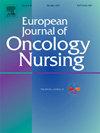Exploring factors influencing body acceptance in women with breast cancer: A cross-sectional study
IF 2.7
3区 医学
Q1 NURSING
引用次数: 0
Abstract
Purpose
Body acceptance in women with breast cancer is a crucial factor related to their physical, psychological health, and quality of life. However, research on the factors influencing body acceptance in this population is lacking. This study aims to identify these factors to provide insights for developing tailored interventions.
Methods
We conducted a cross-sectional study with 258 participants via an online survey in September 2023. Variables measured included general and disease-related characteristics, self-esteem, resilience, social support, objectified body consciousness, and body acceptance. We analyzed the data using descriptive statistics, frequency analysis, independent t-test, one-way ANOVA, Scheffé’s test, Pearson’s correlation coefficient, and hierarchical regression analysis.
Results
Among participants’ characteristics, we identified age, religion, menstruation status, elapsed period after diagnosis, cancer stage at diagnosis, and current treatment as factors influencing body acceptance. Additionally, higher resilience (β = 0.35, p < .001), increased social support (β = 0.13, p = .037), and lower objectified body consciousness (β = −0.31, p < .001) positively influenced body acceptance. Collectively, these variables accounted for 78.9% of variance in body acceptance.
Conclusion
This study offers valuable insights into the factors affecting body acceptance in women with breast cancer. The findings highlight the need for tailored interventions that enhance resilience, foster social support, and address objectified body consciousness. Future research should validate these findings across diverse populations and refine personalized care strategies in clinical practice.
求助全文
约1分钟内获得全文
求助全文
来源期刊
CiteScore
4.40
自引率
3.60%
发文量
109
审稿时长
57 days
期刊介绍:
The European Journal of Oncology Nursing is an international journal which publishes research of direct relevance to patient care, nurse education, management and policy development. EJON is proud to be the official journal of the European Oncology Nursing Society.
The journal publishes the following types of papers:
• Original research articles
• Review articles

 求助内容:
求助内容: 应助结果提醒方式:
应助结果提醒方式:


